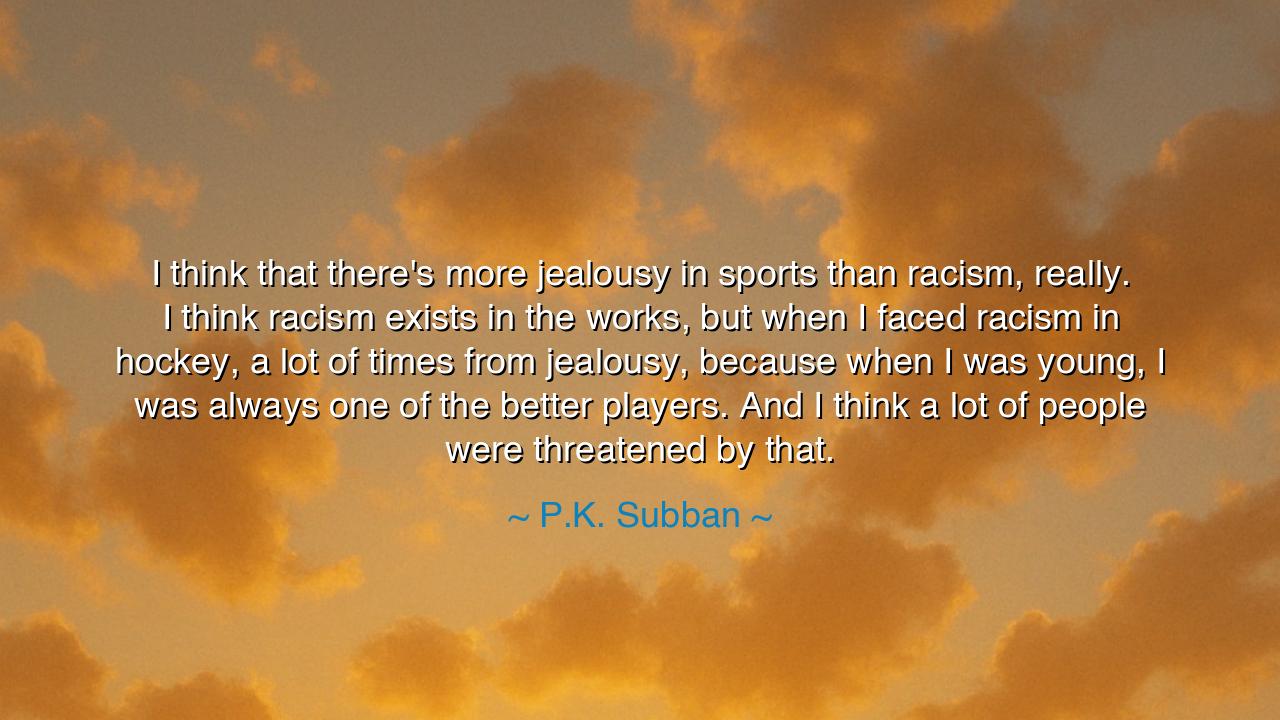
I think that there's more jealousy in sports than racism, really.
I think that there's more jealousy in sports than racism, really. I think racism exists in the works, but when I faced racism in hockey, a lot of times from jealousy, because when I was young, I was always one of the better players. And I think a lot of people were threatened by that.






In the bold and reflective words of P.K. Subban, the renowned hockey player and trailblazer, there sounds a truth forged in the fires of both excellence and adversity: “I think that there’s more jealousy in sports than racism, really. I think racism exists in the works, but when I faced racism in hockey, a lot of times from jealousy, because when I was young, I was always one of the better players. And I think a lot of people were threatened by that.” These words do not deny the existence of racism, but rather reveal its deeper roots — the jealousy that festers in the hearts of those who cannot bear to see another rise above them. In his voice we hear not bitterness, but understanding: that envy, cloaked in prejudice, often disguises itself as hatred, and that the truly gifted must learn to meet such venom with strength and grace.
To understand the origin of this truth, we must look to the life of P.K. Subban himself, a man who broke through the ice not only as an athlete, but as a symbol of possibility. Born in Canada to immigrant parents from the Caribbean, he entered the world of hockey — a sport long dominated by white players and traditions. There, his brilliance and energy quickly set him apart. Yet with greatness came resentment. To many, his confidence seemed audacious; his joy, unsettling. And so, jealousy crept in — that ancient poison that transforms admiration into hostility. Some masked it with racism, others with disdain, but its essence was the same: the refusal to celebrate another’s light because it cast shadows on their own.
In this, Subban speaks a truth that transcends sport and time. For in every age, jealousy has been the silent enemy of greatness. Racism, while born of ignorance and fear, is often fueled by the same fire — the desire to diminish what threatens the fragile ego. When one excels beyond expectation, especially in places they are not “supposed” to, envy takes root. The weak-hearted do not ask, “How did he rise so high?” They ask instead, “How can I bring him down?” Thus, what we often call prejudice is, at its core, the fear of excellence — the terror of confronting one’s own mediocrity in the face of another’s triumph.
The ancients knew this truth well. Consider the story of Joseph, the dreamer of Israel. His brothers despised him, not for his race or blood, but because of the favor he held — the coat of many colors that symbolized his father’s love and his destined greatness. Their envy drove them to betrayal, selling him into slavery. Yet Joseph’s wisdom turned their malice into his ascent. Like Subban, he learned that the hatred of others often springs from their sense of smallness, and that the only true answer to envy is to keep rising. For jealousy feeds upon resentment, but it starves in the presence of perseverance.
Subban’s words, though spoken of sports, apply to every field of human endeavor. In the arenas of art, science, politics, and even friendship, jealousy remains one of the most corrosive forces known to man. It divides teams, poisons communities, and blinds the envious to their own potential. Yet the wise understand that to be envied is not a curse, but a measure of impact. The one who awakens jealousy in others has already surpassed the ordinary. The key, then, is not to resent the jealous, but to pity them — for while you climb mountains, they remain shackled by their own insecurity.
And yet, there is another lesson in Subban’s reflection — one of compassion. He does not speak with hatred toward those who envied or attacked him. He speaks with insight. He recognizes that jealousy often arises from pain — from those who feel unseen, unworthy, or forgotten. This perspective transforms bitterness into empathy. For the truly strong do not return hate for hate; they understand, as the ancients did, that wisdom lies in seeing the human heart beneath its armor of anger. Thus, Subban’s victory is not only on the ice but in the spirit — he conquered not merely opponents, but the bitterness that could have consumed him.
The lesson, therefore, is clear and timeless: let your greatness speak for itself, and let jealousy be your proof of impact. When others label or despise you, see through their words to the wound that drives them. Do not let their fear dim your flame. Remember always that envy is the tax the world places upon success. So, carry yourself as Subban did — with joy that cannot be shaken, with confidence that cannot be shamed, and with purpose that cannot be broken.
So, my listener, take heed of P.K. Subban’s wisdom. When jealousy surrounds you, rise higher. When hatred seeks to bind you, turn it into fuel. For the world will always resist what it does not understand — the brilliant, the bold, the different. But your task is not to win their approval; it is to fulfill your destiny. Let your excellence be your answer, your resilience your revenge, and your kindness your crown. For in the end, jealousy fades, but greatness endures — shining all the brighter for having withstood the darkness that tried to extinguish it.






AAdministratorAdministrator
Welcome, honored guests. Please leave a comment, we will respond soon